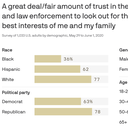Axios-Ipsos poll: Massive gulf in public opinion based on race

Published Date: 6/2/2020
Source: axios.com
Data: Ipsos/Axios survey; Note: ±3.2% margin of error; Chart: Andrew Witherspoon/AxiosA new Axios-Ipsos poll finds that America has a massive racial gulf on each of our twin calamities — trust in police, and fear of the coronavirus.77% of whites say they trust local police, compared with just 36% of African Americans — one of many measures of a throbbing racial divide in Week 11 of the Axios-Ipsos Coronavirus Index, taken the week George Floyd was killed by a white policeman in Minneapolis. 75% of African Americans say they're extremely or very concerned that coronavirus is doing greater damage to people of color, while 30% of whites and 42% of Hispanics share that concern.70% of African Americans say they're very concerned that official responses to the pandemic are being biased against some racial groups. Only one-third of whites, and about half of Hispanics share that view.Why it matters: Cliff Young, president of Ipsos U.S. Public Affairs, said the pandemic has exacerbated "a longstanding set of grievances in the African-American community with the police and how they deal with the community.""Race differences are massive. And it's simmering," Young said. "You take this issue and you overlay just the absolute hopelessness people are feeling." In a gauge of empathy, the responses show a staggering partisan divide on concern that coronavirus is doing greater damage to people of color: 64% of Democrats think that, while just 14% of Republicans do. Women are more likely than men to worry about the racial inequities of the virus.The country is also divided by age: Half of younger Americans trust the police, compared with 80% of seniors.Republicans are more likely than Democrats to trust the police, 78% to 63%. What they're saying: Nikki Jones, a professor at the University of California-Berkeley and an expert on African Americans' experiences with the criminal justice system, said the findings on police trust are in keeping with divisions since the protests in Ferguson, Mo., after the killing of Michael Brown in 2014.But Jones was jolted by the poll's findings on the deficit in white concern that the pandemic is disproportionately hurting African Americans — and on whites' doubts that there's a bias in officials' response. "The striking lack of concern for black people — and the striking ignorance of bias —it is shocking to see those numbers play out" and it could feed the "devastating consequences we're seeing now.""It also makes me angry" because "some people have the luxury of ignorance and other people don't."The big picture: Even as the racial dynamics of the pandemic reflect entrenched systemic inequities, Week 11 of our national survey finds an overall softening of Americans' fears and precautions as states continue to reopen their economies.45% of respondents said they've visited friends or relatives in the last week, up seven percentage points from the previous poll and up dramatically from its low point of one in five.37% visited a non-grocery retail store in the past week.Only one in four says they're still self-quarantining.One-third visited a park, beach or other outdoor space.18% went out to eat.12% visited a salon, barbershop or spa.Most still see risk in returning to their normal pre-coronavirus lives, but their fears are softening, as more are starting to view it as a moderate rather than severe risk.While most people are still wearing masks outside the home, men and middle-aged people were more likely to report being told to take off their masks in certain situations, while young people were more likely to report worrying about how others view them in their masks.Methodology: This Axios/Ipsos Poll was conducted May 29-June 1 by Ipsos' KnowledgePanel®. This poll is based on a nationally representative probability sample of 1,033 general population adults age 18 or older.The margin of sampling error is ±3.2 percentage points at the 95% confidence level, for results based on the entire sample of adults, and ±10 percentage points for responses by African Americans, who make up 13% of the U.S. population.